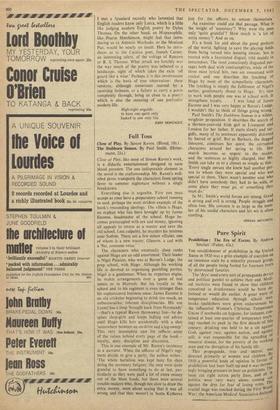Full Toss Close of Play, like most of Simon Raven's
work, is a didactic entertainment designed to raise blood pressure. The one indisputable element in the novel is the craftsmanship. Mr. Raven's well- oiled prose transports the characters from spring fever to summer nightmare without a single breakdown.
Everything else is arguable. First you must accept as your hero a preparatory school running to seed, perhaps the most strident example of the book's resounding ideology. The villain is Hugo, an orphan who has been brought up by James Escome, headmaster of the school. Hugo be- comes preoccupied with sex and money, ignoring all appeals to return as a master and save the old school. Less culpably, he murders his mistress near Sodom. There are a few minor villains, one of whom is a new master, Gleason. a cad with a 'flat, common voice.'
The characters who eventually close ranks against Hugo are an odd assortment. Their leader is Nigel Palairet, who was at Baron's Lodge, the prep school, with Hugo. Although his working life is devoted to organising gambling parties, Nigel is a gentleman. When he organises orgies, he makes arrangements over a game of real tennis or in Harrods. But his loyalty to the school and to his regiment is even stronger than his sophisticated business sense. James Escome is an old cricketer beginning to drink too much, an unbusinesslike,' tolerant disciplinarian. His son Lionel has a limp 'brought back from Normandy' —that's a typical Raven throwaway line—he de- spises shop-girls and keeps ladling out advice until Hugo kills him accidentally with a shot `somewhere between an on-drive and a leg-sweep.' This very incomplete cast list reflects some of the values behind every page of the book— loyalty, duty, discipline and discretion.
This is one example of Mr. Raven's insistence as a narrator. When the officers of Nigel's regi- ment decide to give a party, the author writes: `The whole battalion was kept busy for days doing the necessary fatigues; the men were quite grateful to have something to do at last, par- ticularly as they were paid a lot of extra money out of the Mess funds, but there were several trouble-makers who, though not slow to draw the extra money, went about saying that it was all wrong and that they weren't in Santa Kytherea
just for, the officers to amuse themselves.'
An examiner could use that passage. What is the weight of 'necessary"? Why were the men only 'quite grateful'? How much is 'a lot of extra money"? And so on.
It's a book for and about the good prefects of the world, fighting to save the playing fields from being turned into housing estates. Sex is treated with a fascinated disgust, told mainly in innuendoes. The most consciously disgusted pas- sages both deal with contraceptives, while of the three most lyrical bits, two are concerned with cricket and one describes the lynching of Hugo by most of the sympathetic characters. The lynching is simply the fulfilment of Nigel's earlier, gentlemanly threat to Hugo: 'It's nice to work with people one was at school with. It strengthens loyalty. . . . I was fond of James Escome and I was very happy at Baron's Lodge; I wouldn't like to think of things going wrong.
Paul Smith's The Stubborn Season is a wilder, weightier proposition. It describes the search of a thirteen-year-old Irish girl in Liverpool and London for her father. It starts slowly and tur- gidly, many of its sentences apparently distorted by hatred or grief. But as Barbara, the dogged innocent, continues her quest, the corrupted characters around her spring to life. Her search becomes so urgent to the reader, and the sentences so highly charged, that Mr. Smith can take us to a climax as simple as this: `Every single person she knew had another per- son to whom they were special and who was special to them. There wasn't another soul wh° didn't have somebody they had to be with, or some place they must go, or something they must do.'
In Mr. Smith's world forces are strong. Good is strong and evil is strong. People struggle and often lose. His concern is as large as the num- ber of his sordid characters and his wit is often startling.
ADRIAN MITCHELL






































 Previous page
Previous page